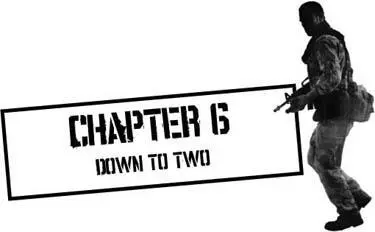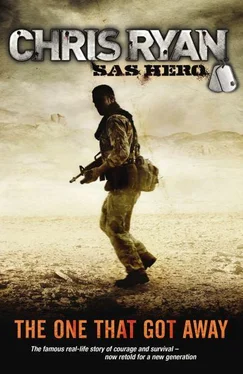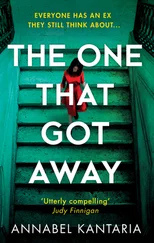We were separated from the rest of the unit.
We had barely any cover.
We could be discovered at any time.
The elements were against us.
But we had to spend the hours of daylight in this shallow ditch if we wanted any chance of escaping.
CHAPTER 6
Down to Two

Friday 25 January: Escape — Day Two
It was so cold. The wind came knifing through my DPMs and smock, so I opened my canvas map case and laid it over my legs. I wrapped one shamag round my head, and pulled the other round my shoulders. Even then I was still freezing. But somehow I must have dozed off, because I woke up shaking violently, with what felt like pins and needles in my face. When I opened my eyes, I couldn’t believe it: it was snowing, and we were covered in white.
‘Look at this!’ I exclaimed bitterly. ‘You’d think we were at the North Pole.’ Nobody answered, so I said, ‘Vince, are you all right?’
He grunted something back.
‘Stan, how are you feeling?’
‘Oh, a lot better.’
That lifted me — just to hear him sounding more like himself.
‘Good,’ I said. ‘Well — get something to eat.’ All I had was my biscuits, so I ate two of them, chewing slowly to produce saliva and work them down. Stan and Vince both ate something too.
The worst result of the night — though I didn’t realize it immediately — was that I’d badly hurt my feet. The problem was my socks. They were made of rough grey-brown wool, and because our build-up had been done in such a rush, I’d worn them for four or five days on end before the deployment. By the time we started walking, they were already stiff with sand, dust and sweat — and now, as a result, they’d chewed the sides of my feet into large blisters.
The normal treatment — which we’d used on selection courses — would have been to push a needle into each blister, extract the fluid and inject tinc benzine, or Friar’s Balsam. The process felt as if a red-hot poker had been laid against your foot, but it toughened the underlying skin enough for you to be able to walk on it. Even washing my feet and putting on plasters would have helped. But there, trapped in the tank-track, I couldn’t even take my boots off to inspect the damage, let alone do anything to repair it.
Now and then during the day we saw military-looking vehicles driving in the distance. The snow turned to rain, then back to snow. Our ditch filled with water. The water dissolved the earth into mud, and soon we were wallowing in an icy quagmire. There was mud all over us, over our weapons. But all we could do was lie there in it.
I’d often been cold before, but never as cold as that. I became so frozen that I didn’t even want to move my arm so that I could see my watch, and I asked Stan what the time was. ‘Twelve o’clock,’ was the answer. Was this day ever going to end?
In the tank-ruts, it was impossible to concentrate on anything for long, the discomfort was so intense. The only plus was that Stan seemed to be back to his normal spirits. He’d brought a proper boil-in the-bag meal in his belt-kit, and once he’d got that down him, he was ready to go. Vince, on the other hand, was feeling the cold the worst of any of us. He wasn’t whingeing, but he kept saying, ‘Chris, I can’t feel my fingers. I’m freezing.’
‘So am I,’ I told him. ‘But we can’t do anything, Vince. We can’t move, so we’ve just got to stick it out.’
‘Can’t we cuddle in together?’ Sharing body heat to stave off hypothermia was a good idea but it wasn’t possible right now.
‘Not yet. It’s too dangerous to move.’
The temptation to get up and go, to start moving again, was colossal: anything would be better than enduring this agony. But one of the Regiment’s most basic SOPs is that during escape and evasion you don’t move in daylight. If we were spotted walking, Iraqis would come at us from all sides. Grim as it was, I knew we should stay where we were.
Then, late in the afternoon, Vince worried me by saying, ‘Look — I’m going down here.’
We had to do something. We had to take the risk.
‘What’s the time, Stan?’
‘Four o’clock.’
‘Let’s cuddle in, then.’
Vince and I wriggled further down to where Stan lay, where the track was a bit wider. At that point we were all coming out into the open, but we accepted the danger and lay together, cuddling in for warmth, with me in the middle and the other two on the outsides.
After what seemed an age, I asked again, ‘What’s the time, Stan?’
‘Five past four.’
This was real torture. It seemed like an eternity, lying there caked in freezing mud, with icy water soaking through our clothes. Whenever the snow stopped, the wind would get up and bring on the rain, and then the snow would start again…
Friday 25 January: Escape — Night Two
At last, at about five-thirty, darkness began to fall, and we decided to crawl inside the berm so that we could shift around and get some feeling back into our bodies. But until we tried to move, we didn’t realize what a state we were in.
My fingers and toes were numb, but that was to be expected. It was when I went to stand up that I really got it: the pain in my knees and back was outrageous. I felt as if I had acute arthritis in my spine and hips. For a moment I was hit by despair.
We dragged ourselves inside the berm and tried to run around, to start the energy going and get some heat moving inside our bodies. But my feet were still numb, and clay had built up on the soles of my boots so I could hardly make any progress. Our hands were so dead that we couldn’t even pick up our weapons — but luckily they had slings, so we ducked down, put our heads through the slings and stood up.
As Vince did so, he said, ‘Chris — I can’t carry my weapon. I just can’t.’
I heard the note of desperation in his voice, so I just said quietly, ‘Stan, you take it for him.’ Stan took Vince’s 203, leaving him with his pistol.
My memories of the next few hours are hazy, because I was being hit by hypothermia. All three of us were. But even though my mind was becoming clouded, I knew we had to keep moving.
‘Right, fellers,’ I said. ‘We’re going to have to start off again.’ So away we went. I was stumbling with my weapon slung over my shoulder and my hands tucked under my arms, trying to get some feeling back into them. I kept thinking, If we have a contact, we’re done for, because we won’t be able to shoot back . I couldn’t have pulled the trigger or changed magazines to save my life.
Then the clouds thickened up. Another flurry of snow drove into our faces, hurtling in from the north-west, and soon we were tabbing over ground as white as on a Christmas card. The blizzard hid us, but we were blinded too and could easily walk onto an enemy position without spotting it.
When the moon came out again, the desert was light as day, and I could read my map without the torch. Vince, who kept falling behind, called, ‘Hey, you’re going to have to slow down. I need a rest.’ Vince was highly-trained, fit, professional and very tough — but the cold was clearly hitting him harder than either Stan or myself.
‘Vince,’ I reminded him, ‘you can’t rest. We’ve got to keep moving, see if we can warm ourselves up.’
But although we were walking hard, we weren’t getting any less cold. Normally, after you’ve walked for an hour, your circulation’s really going, and you’re warm all over. But because our clothes were soaked through, and this bitter wind was blowing, the chill-factor was keeping our body temperature right down. Also, there was no fuel left in me to re-stoke the fires: I’d burned it all up.
Читать дальше













